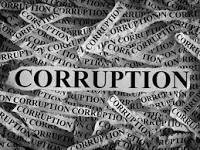
ZIMBABWE is, in many ways, a crime scene. The rampant and systematic corruption — permeating both the private and public sectors — has reached alarming levels.
From petty bribery to grand corruption, the rot has consumed a once prosperous nation, now reduced to begging for food aid to feed its starving population.
It is a painful irony that a country once known as Africa’s breadbasket has become a basket case. What an oxymoron.
Of course, there are many reasons that have contributed to this decline, including droughts and poor agriculture planning.
However, corruption has undoubtedly played a major role in decimating the economy. It has ravaged the country.
It was not shocking for Vice President Constantino Chiwenga to ring the alarm bells, saying graft was now a security threat.
Chiwenga told the Chartered Governance and Accountancy Institute in Zimbabwe annual conference in Victoria Falls that corruption was undermining the rule of law and eroding public trust in private and public institutions.
We could not agree more with the VP! We may disagree on quite a number of emotive issues but he hit the nail on its head about the worrying corruption trends in Zimbabwe.
- Lobby group bemoans impact of graft on women
- Corruption watch: Rogue cops: Blame it on the bosses
- DJ Ladyg2 fights stereotype in showbiz
- Corruption watch: Who is benefitting from the Pomona sham deal?
Keep Reading
Chiwenga remarked: “It is important to recognise that corruption represents a serious threat to our nation’s progress, distorting markets, undermining the rule of law and eroding public function as professionals in key positions across both private and public institutions”.
Zimbabwe loses an estimated US$2 billion annually to graft, according to official data from the Zimbabwe Anti-Corruption Commission (Zacc).
Transparency International, in 2023, placed Zimbabwe at 149 least corrupt nation out of 180 countries.
The country has consistently underperformed in this index, averaging a ranking of 129,65 from 1998 to 2023.
Its worst performance came in 2008, when it plummeted to 166th. This is coming from a low of 43 in 1998.
These numbers tell a painful story — corruption has been a thorn in Zimbabwe’s side for decades, and little has been done to plug the financial leakages in critical sectors like mining, public procurement, and border management.
In central government, taxpayers' money is regularly siphoned off, and the situation is no better at the local level.
Reports from Harare Town House indicate that local authority officials have been squandering ratepayers’ money.
In all this, just a handful of elite individuals are benefiting. The rest of Zimbabweans continue suffering; surviving from hand to mouth.
There are several institutions established to deal with corruption, and these include the police, Zacc, the Special Anti-Corruption Unit in the Office of the President and Cabinet (Sacu) and Commercial Crimes Court.
But the question is; are these institutions doing enough to combat corruption?
The state has been accused of a systematic “catch and release” game.
Many of those taken to court are individuals who have fallen out of favour with the ruling elites, while those in good standing continue to flaunt their ill-gotten wealth with impunity.
Beneficiaries of questionable government tenders are openly enriching themselves, often at the expense of the nation. The corruption surrounding these tenders is appalling.
Goods and services are highly overpriced. Imagine a server that costs US$5 000 being sold to a government institution for a staggering US$1,6 million. And yet, no one is held accountable. No one is punished.
Instead, these corrupt “tenderprenuers” are building the most luxurious mansions in the plush suburbs of Harare.
It is a travesty of justice and a slap in the face to a nation where over 50% of the population lives in extreme poverty.
If the stolen wealth were put to good use, Zimbabwe could drastically improve its public services, from healthcare to infrastructure, and elevate the standard of living for millions of its citizens.
This makes a case for government to be serious in dealing with corruption at all levels.
Lip service erodes trust, and it does not deter the cartels from creaming off the wealth.
As the watchdog, we will continue to hold the government and public institutions accountable. We will not relent in speaking truth to power, because the stakes are too high.
Corruption is more than an economic issue — it is, as the VP said, a “national security threat”.






